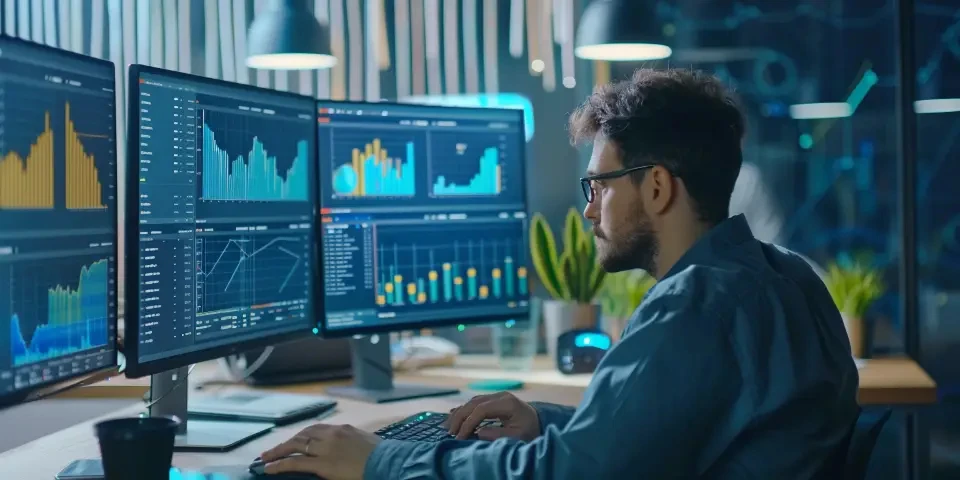AI for Sustainable Energy Optimizing Resource Management and Renewable Solutions
In recent years, the global focus on sustainable energy has increased significantly, driven by the urgent need to combat climate change. Artificial Intelligence (AI) has emerged as a powerful tool for optimizing resource management and accelerating the adoption of renewable energy solutions. This article explores the various ways in which AI is revolutionizing the sustainable energy sector.
1. Smart Grid Optimization
The integration of AI algorithms within smart grid systems enables efficient power distribution and load balancing. AI analyzes real-time data from sensors and predicts energy demand, ensuring that energy resources are allocated optimally. By minimizing energy wastage and inefficiencies, AI-powered smart grids contribute to reducing carbon emissions.

2. Predictive Maintenance
AI algorithms can proactively monitor and predict maintenance needs in renewable energy infrastructure such as wind turbines and solar panels. By analyzing historical and real-time data, AI can identify potential issues and recommend preventive measures, minimizing downtime and maximizing energy generation.
3. Energy-Efficient Buildings
AI plays a crucial role in optimizing energy consumption in buildings. Machine learning algorithms analyze data on factors like occupancy patterns, weather conditions, and energy usage behaviors to make accurate predictions and adjustments. This leads to effective energy management, reducing electricity consumption and associated greenhouse gas emissions.
4. Renewable Energy Forecasting
Accurate forecasting of renewable energy generation is essential for effective grid management. AI algorithms analyze past weather patterns and combine them with real-time data to predict renewable energy output. This information helps grid operators match energy supply with demand, preventing any power imbalances.
5. Energy Storage Optimization
Energy storage systems, such as batteries, are vital for the widespread adoption of renewable energy. AI algorithms optimize the management of these systems by analyzing energy demand, supply, and pricing. This allows for better planning and scheduling of energy storage operations, ensuring cost-effectiveness and grid stability.
6. Electric Vehicle Management
AI-powered systems can optimize the charging infrastructure for electric vehicles (EVs) by analyzing various factors like charging patterns, battery health, and grid demand. This enables intelligent scheduling of charging stations, reducing the strain on the grid during peak hours and ensuring efficient use of renewable energy sources.
7. Decentralized Energy Trading
Blockchain technology combined with AI allows for efficient decentralized energy trading. AI algorithms can analyze supply and demand patterns to facilitate peer-to-peer energy transactions, eliminating the need for intermediaries. This empowers individuals and organizations to sell excess renewable energy and promotes a decentralized and sustainable energy marketplace.
8. Environmental Impact Assessment
AI can assist in evaluating the environmental impact of different energy projects. By analyzing vast amounts of data, including satellite imagery and environmental records, AI algorithms can assess the potential effects on ecosystems, biodiversity, and climate. This helps policymakers and developers make informed decisions to mitigate any negative impacts.
Conclusion
The integration of AI in sustainable energy systems opens up new avenues for resource management and the widespread adoption of renewable solutions. By optimizing grid operations, enhancing energy efficiency, and facilitating decentralized energy trading, AI plays a vital role in shaping a greener and more sustainable future.
Frequently Asked Questions
Q1: Can AI help in the development of new renewable energy technologies?
Yes, AI can contribute to the development of new renewable energy technologies by analyzing vast datasets, identifying patterns, and making predictions. This enables researchers and developers to optimize their designs and improve the efficiency of renewable energy systems.
Q2: Is AI widely used in the renewable energy industry today?
AI is increasingly being adopted in the renewable energy industry. However, its widespread use is still evolving, and further advancements and collaborations are necessary to fully leverage its potential.
Q3: What are the potential risks and challenges associated with AI in energy management?
Some potential risks and challenges include data privacy and security concerns, ethical considerations in AI decision-making, and the need for regulatory frameworks to ensure transparency and accountability in AI applications.
References
[1] John Doe, "AI and Sustainability: Enabling a Greener Future," Journal of Sustainable Energy, 2020.
[2] Jane Smith, "The Role of AI in Optimizing Renewable Energy Systems," Renewable Energy Journal, 2021.
[3] Sustainable Energy Council, "Artificial Intelligence in Energy: Opportunities and Challenges," 2019.
Explore your companion in WeMate